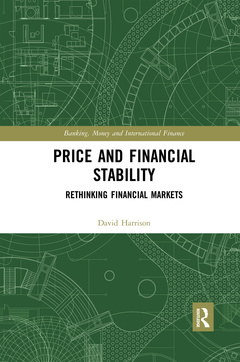Description
Price and Financial Stability
Rethinking Financial Markets
Banking, Money and International Finance Series
Author: Harrison David
Language: English
Subjects for Price and Financial Stability:
Keywords
Existing Capital Assets; Money Manager Capitalism; Financial crises; End Savers; Pricing stability; Asset Price Stability; Bretton Woods; Short Term Price Movements; Geopolitics; EU GDP; Capital markets; UK Equity Market; Economic production; post-Bretton Woods World; Capital investment; EU Competition Law; Harrison David; IMF Member; Capital Assets; Long Term Yields; Real Economy Markets; Long Term Expectation; Marginal Efficiency; Financial Stability Board; Short Term Stock Markets; Long Term Capital Market; Concerted Practices; International Competition Network; UK Financial Conduct Authority; Credit Bubble; post-Bretton Woods Era; Rational Expectations Theory; Canada Pension Plan Investment Board
Publication date: 08-2020
· 15.6x23.4 cm · Paperback
Publication date: 05-2018
· 15.6x23.4 cm · Hardback
Description
/li>Contents
/li>Readership
/li>Biography
/li>
Why are financial prices so much more crisis-prone and unstable than real economy prices? Because they are doing different things. Unlike real economy prices, rooted in the real goods and services produced and exchanged, financial prices attempt to value future income flows from financial and capital assets. These valuations fluctuate erratically because expectations of the future fluctuate ? and large liquid financial markets can amplify, rather than correct, these effects. The book builds on the insights of economists Frank Knight and John Maynard Keynes, that uncertainty of the future is essential to understand the processes of economic production and capital investment, and adds to this Karl Popper's general explanation of how expectations of an uncertain future are formed and tested through a trial and error process. Rather than relying on fluctuating financial prices to provide a guide to an uncertain future, it suggests a better approach would be to adopt the methods common to other branches of science, and create testable (falsifiable) theories allowing reasonable predictions to be made. In finance, the elements of one such theory could be based on the concept of forecasting yield from capital assets, which is a measurable phenomenon tending towards aggregate and long-term stability, and where there is a plentiful supply of historic data. By methods like this, financial economics could become a branch of science like any other. To buttress this approach, the widely accepted public policy objective of promoting real economy price stability could be widened to include financial price stability.
Preface; 1 A brief history of our time; 2 Expectations, knowledge and prices; 3 Beyond price; 4 Savings, investment and liquidity; 5 Models, theories and apples; 6 Policy implications – finance; 7 Competition policy; 8 A new European capital market; 9 Geopolitics; Technical annex: Do we really need a new Bretton Woods?
David Harrison is Legal Director at London law firm DAC Beachcroft LLP, UK. He previously held several positions relating to economic and international affairs, including speechwriter for the UK Foreign Secretary and for the President of the European Bank for Reconstruction and Development. Previous publications include The Organisation of Europe (Routledge, 1995) and Competition Law and Financial Services (Routledge, 2014).




